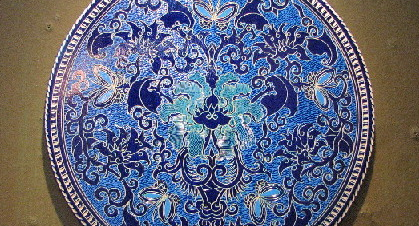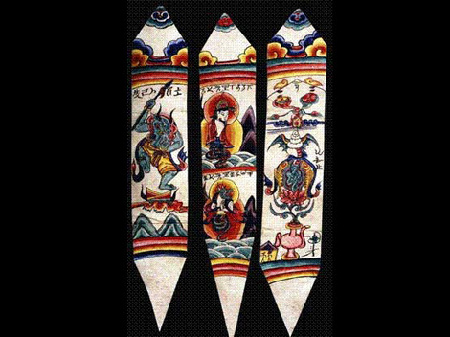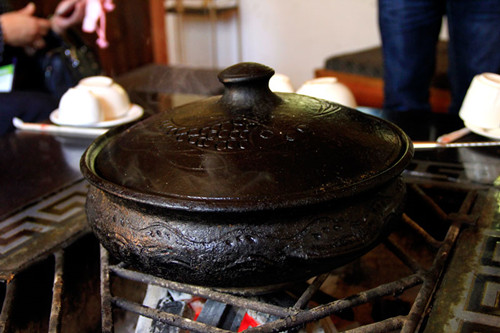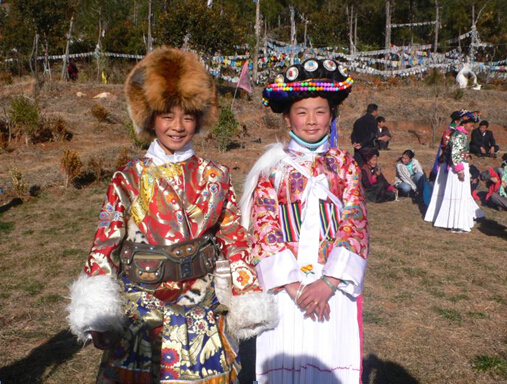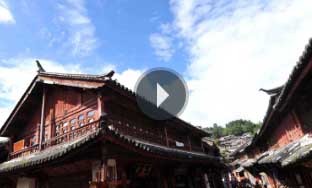Dancing in twilight
Elders in Naxi villages struggle to keep their music and culture alive, but a recent event helped this mission. Chen Nan reports in Lijiang, Yunnan province.
As darkness falls and the temperature drops, He Jixiang sings and dances in a big clearing, with 11 villagers, most of whom are older than 60. In the small village called Huayin in Tai'an township in Yulong Naxi autonomous county, 30 km southwest of Lijiang city in Yunnan province, winter is freezing and electricity is scarce.
He, 82, is from the Naxi ethnic group, and recalls playing as a child in the farmland, where rapeseed flowers bloom during July and August.
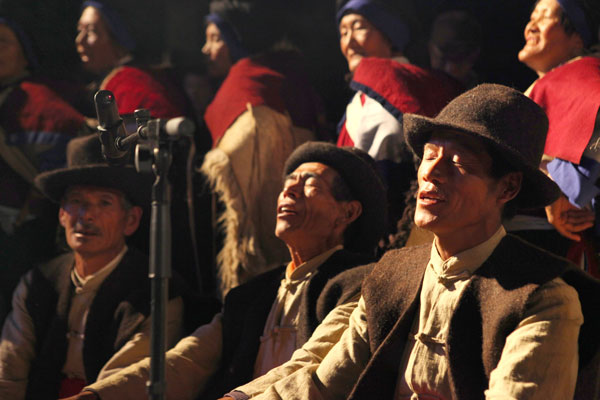 |
|
Huayin villagers perform traditional Naxi songs and dances at the Co-Art Festival in Shuhe Old Town in Yunnan province's Lijiang. PHOTO BY HU YUANJUN / FOR CHINA DAILY |
His father was a dongba, meaning "wise man" in the Dongba culture and religion created by the Naxi about 1,000 years ago. A dongba is the most respected and sacred leader in the village, who also carries on the traditional language, songs and dances.
Whenever there were big occasions, like weddings, funerals and prayers to the gods, his father led the villagers to practice ceremonies — singing in ancient Naxi dialect and dancing around campfire.
He just went to school for a year and joined his father at ceremonies, where he became fascinated by the long, dramatic and high-pitched melodies.
Since his father passed away, He has become one of the few remaining among the Naxi who can stage those ancient ceremonies and chant the complete songs.
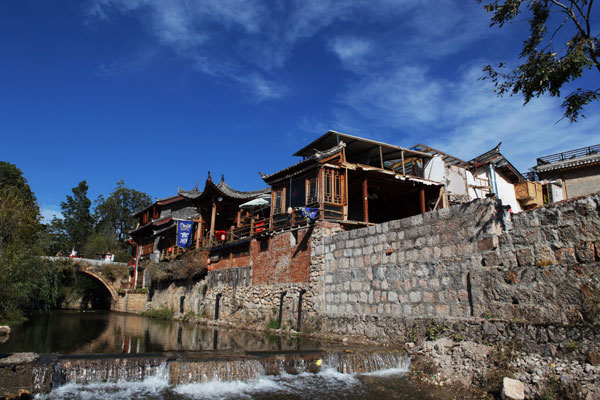 |
|
Picturesque Shuhe offers a perfect setting for the art festival. PHOTO BY HU YUANJUN / FOR CHINA DAILY |
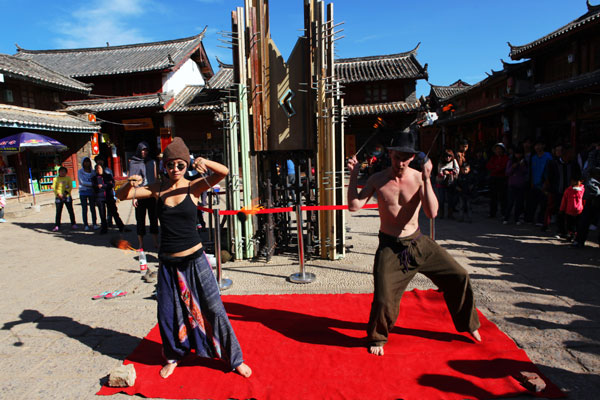 |
|
The Co-Art Festival draws both local and foreign artists. PHOTO BY HU YUANJUN / FOR CHINA DAILY |
He says women are not allowed to learn the ceremonial songs, so he has been looking for young men in the village to study them. However, he says, the young generation is not so interested, and he worries because those songs and dances are dying.
What made the old man happy recently was the performances he gave during the Co-Art Festival, which brought a variety of events, including dramas, modern dances and art exhibitions from Oct 31-Nov 4 to Shuhe Old Town, only 7 km from Lijiang's old town, another place protected as a UNESCO World Heritage site.
The slow and deep funeral song Meng Da is about the person who has died, describing his life from coming into the world to becoming ashes. The bright and happy wedding song Han Wo O wishes the newlyweds a prosperous life and long-lasting love.
The old people sit around the campfire in their traditional cotton clothes and goatskin capes. The bright red scarves tied around their waists, according to He, symbolize the Jinsha River.
"The river has nourished our Naxi culture," he says. Audiences are amazed by their singing and dancing and spontaneously join in.
He Liyuan, from Huayin village, is the person who helped organize the performance team to display the ancient ceremonial songs and dances. When he came to He Jixiang one day in 2007, the old man nodded yes without hesitation.
He Liyuan, 31, is a Naxi folk dancer in a singing and dancing troupe from Yulong Naxi autonomous county. He recalls hearing the ceremonial songs when he was about 4. The melodies and lyrics, which are in ancient Naxi dialect, sounded mysterious, and he was curious to explore the stories behind them.
An old woman living next to his family, who sang folk songs every day, inspired He Liyuan's determination to revive ancient Naxi songs. He liked sitting next to her and listening to those tunes.
But when the woman passed away at the age of 90, He Liyuan suddenly realized that he couldn't listen to those songs anymore. "The death of the old woman made me sad. The songs died with her," he says.
He started looking for singers who remained in the village in 2006.
In 2008, he found He Jixiang and a dozen other elders in the village, who could remember pieces of those songs. One old man knew the ancient songs but had become too old to sing them. He died two years ago.
"There's an enthusiasm or at least a lack of shyness when they're singing at home," He Liyuan says of the Naxi. "Here, these performances are genuine and real, and filled with emotion."
He Xiangyang, 38, one of He Jixiang's sons, started learning those songs and dances from his father at age 25.
He is also studying at a Dongba school, which was founded by the local government in 1993 to preserve the Dongba culture. He has studied the community's history and traditions, including the ancient language, folk stories and drawings. He has already finished three years of study and will graduate in two years.
"We Naxi have the tradition of singing and dancing. We sing about everything — farming, births, deaths and love," he says.
He Xiangyang is also teaching his 8-year-old son He Ping to study the Dongba culture and ancient songs.
Huayin village has 77 families with 286 people, 99 percent of whom are ethnic Naxis. The average annual household income is 10,000 yuan ($1,600) and is earned by growing potatoes and colza.
He Liyuan realizes that trying to popularize Naxi music is a daunting task: Most young people would rather play mahjong than listen to folk music. Many are going out to work in big cities, and some never return. "They give up the tradition quite easily," he says.
Every Saturday, He Liyuan gathers the old people of the village to rehearse and study together in an abandoned school. He Jixiang teaches the songs word-by-word and explains the meaning of each sentence.
The troupe has performed at various galas in Lijiang city since 2008.
He Liyuan says that because those old people have spent their whole lives in the village, he has to teach them how to use the toilet and how to sing in front of microphone when they go to the city.
But no compromise to modernization is needed for the music. "The old men and I don't want to disturb the originality of the music. Just a campfire and an outdoor space would be enough for them, and any decorative or experimental plots are no good to them," He Liyuan says.
He says that they will try their best to keep these music and tradition alive, but a valuable part of the centuries-old tradition will inevitably be lost.
"Those old people in the troupe are keepers of the oral tradition, along with their own history," He Liyuan says. "It's all in their own heads."
Contact the writer at chennan@chinadaily.com.cn.

